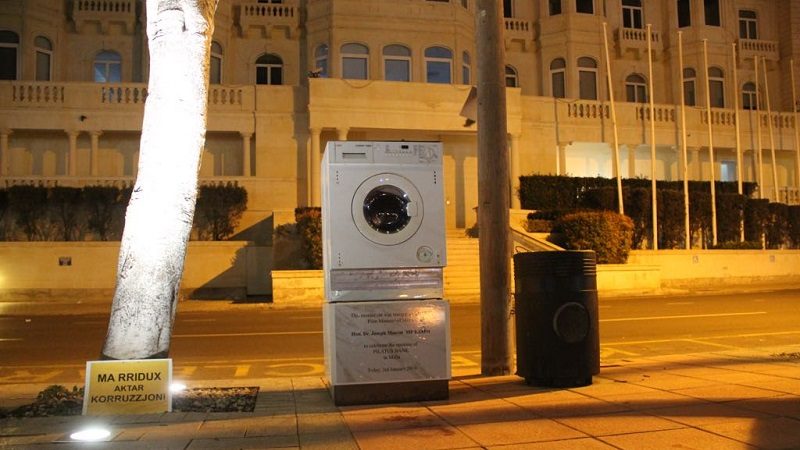The latest revelations coming from a New York court on Pilatus Bank owner Ali Sadr have confirmed suspicions that the dodgy bank was not only set up for the specific purpose to launder money, but it was built on dirty money.
Despite the Maltese government’s insistence that Pilatus Bank has nothing to do with Ali Sadr’s arrest in the US, it now emerges that the dodgy bank is indeed involved in the masterplan to evade US sanctions and launder money.
“Whatever assets remain after the bank is unwound by the Maltese authorities will be ‘significantly’ less than $12.9 million. But, more significantly, regardless of how much money the defendant ultimately receives, his equity in Pilatus Bank is forfeitable because it constitutes criminal proceeds directly linked to the Venezuela project – the defendant used money from the project (CHF 1 million (Swiss Francs) and €8 million) to establish and capitalize Pilatus Bank in 2013,” US district attorney Geoffrey Berman said according to a transcript of the proceedings tweeted by MP Karol Aquilina.
This is hardly surprising given that two months ago The Shift News in collaboration with Swiss digital magazine Republik, revealed that Ali Sadr who was arrested in the US on charges of money laundering and evading US sanctions on Iran, had used companies in Switzerland hidden behind an international trustee to evade US sanctions.
The financing for Pilatus Bank in Malta came, at least in part, from Swiss Perse Finance registered in Zug, an affluent municipality in Switzerland, The Shift News had reported at the time.
The US district attorney’s damning statement and the revelations by journalists show that the Malta Financial Services Authority (MFSA) was at best complacent and at worst complicit in the establishment of a dodgy bank set up from illegal proceeds, PN MEP David Casa said in a statement.
When taken into the context of botched investigations by the MFSA and the anti-money laundering agency (FIAU), it is not too hard to suspect that the Maltese authorities kept their eyes shut to facilitate the setting up of a bank on dirty money.
This demands answers from the MFSA and Prime Minister Joseph Muscat, who is directly responsible for the regulatory body.
Why did the MFSA grant Ali Sadr a licence to open a bank in Malta if dirty money was involved? Why did the due diligence process give Pilatus Bank a clean bill of health? Why were no sanctions imposed by the MFSA following a damning report by the FIAU which was later retreated under unclear circumstances? Why did the MFSA fail to take any action against the bank despite the discovery of several PEPs in the bank’s client list? Why did MFSA inspectors refuse to inspect Pilatus Bank three days before the June 2017 election?
On whose instructions was the authority acting? What role did the Prime Minister’s chief of staff Keith Schembri, who is one of the bank’s clients, play in this debacle? What role did KPMG play in helping Ali Sadr gain a licence? Where did the money retrieved from Pilatus Bank since 2017 go?
Why was Maria Efimova, a Pilatus Bank whistleblower who uncovered the bank’s involvement in money laundering, hounded by Maltese authorities instead of being granted protection?
If these unanswered questions do not merit an independent inquiry into the MFSA’s actions (or inactions) and the complicity of the Castille cabal then we truly live in desperate times. The outcome of such inquiry is another matter altogether, and probably we’ll be none the wiser if it does take place.
Yet, that’s what happens in democracies and the last time I checked, Malta was still a “democratic republic” on paper.
Anyone who insists that such institutional collapse and impunity does not damage Malta is either cross-eyed or blinded by the money pouring into their bank accounts.
Surely enough, foreign investors are attracted to Malta because of the tax benefits and the legislative framework it offers. A tax regime designed for tax dodgers and a lax legislative framework designed to allow people like Ali Sadr to set up shop in Malta without any questions being asked.
The apologists might be right in saying that things are being blown out of proportion had Pilatus Bank been an isolated incident. But it is not. In only five years, the Labour regime has overseen the controversial sale of state hospitals to shady individuals, shady energy deals with SOCAR, opening the EU’s doors to tax evaders and money launderers through the sale of Maltese passports and the infiltration of the Italian mafia in the online gambling sector.
The truth is that Malta is a haven for money launderers and tax evaders. The problem is that it is all legal and politicians and their lapdogs fall head over heels in their attempts to justify Malta’s reputation as a tax haven and money laundering centre by reminding us all that the economy is booming.
The economy is booming and many developers, landowners, accountants, lawyers and various others professionals and service providers are making a killing. But at what cost?
The wealthier Malta becomes on the back of tax evasion and money laundering the bigger the inequalities grow. The kind of economic growth we are experiencing is a catalyst for environmental destruction, a poorer quality of life and deeper social divisions.
If Muscat keeps his word on Constitutional reform, I suggest changing the first article to “Malta is a democratic republic founded on dirty money and on respect for the fundamental rights and freedoms of capital.”
This is not the Malta I want to live in and no amount of short-term prosperity, romantic nationalism or partisan loyalties deeply rooted in 20th century divisions justify the transformation of Malta into a soulless metropolis built on dirty money and by exploited foreign workers.













